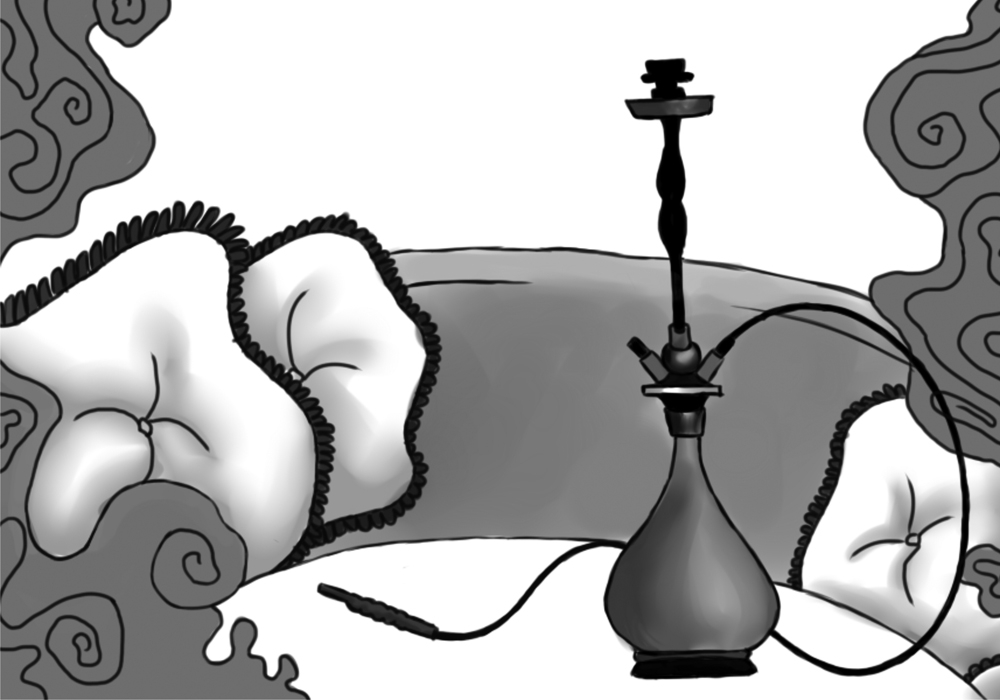As of April 2016, smoking hookah, also known as shisha, will be banned in licensed Toronto vendors. Currently an estimated 70 Toronto businesses, including but not limited to cafes, restaurants, and lounges have been licensed to sell and distribute hookah.
Hookah is a water pipe used to smoke flavoured tobacco, although there are also tobacco-free options. Growing in popularity in recent years, it has long played an important role in Arab and East African cultures.
This raises questions about the intent of this bylaw regarding its legitimacy as it directly targets particular demographics.
There are a number of reasons behind the bylaw, one being that it corroborates the Smoke-Free Ontario Act, which works towards reducing tobacco-smoking and health risks to non-smokers.
Hookah is also said to have a number of toxins with high levels of metals, carbon monoxide, and cancer causing chemicals. Nicotine, the addictive drug that is found in cigarettes, is also present in hookah.
A number of Toronto city councilors insist that the creation of the bylaw is not only to protect the smokers from health dangers, but workers and the consumer public alike as it is gaining popularity and acceptance among youth.
Though smoking hookah can have a negative impact on the user’s health, many are claiming that the decision is unfair towards communities that include smoking hookah as a part of their culture.
“We don’t believe that this has to do with health issues,” says Ashraf Hasouna, owner of Alexandria’s Cafe, which serves shisha in Scarborough.
“If this [ban] is regarding the health of citizens, why is alcohol allowed? It causes brain damage and liver damage.”
Emphasis is made on the idea that young hookah smokers are not aware of the dangers behind hookah.
This creates the illusion that youth, particularly from Arab and East African demographics, blindly put themselves in dangerous positions and need an overarching governing body to steer them away from danger and self-harm.
“We support this decision, not because we discourage the use of shisha, but because we know that there are risks to health associated with it,” says Eileen Bang, team lead of Leave the Pack Behind movement at York.
“We are aware of both the pros and cons to the banning of it, but not everyone is aware and until shisha smoking is better understood, this may be a good temporary step for the city,” says Bang.
“I am completely aware of the health problems that come with smoking shisha,” says Farrah Mohamed, a third-year business and society student who is originally from Morocco. “I make my decision because not only do I enjoy smoking it, I’ve grown up around people smoking it, and it helps me de-stress.”
“Problems will arise because people will want an outlet to go relax in with no harm,” says Hasouna. “I can’t believe that people will go to bars as alternative to this.”
It will result in people going underground and doing shisha at home. It will create more damage to families because people who do it will do it in their home around their families, he adds.
The bylaw seems to be effectively taking away social spaces from youth, but also revenue from vendors as well.
“We have a snack bar, but mainly people come to do hookah and then they add food and beverage,” says Hasouna.
And while other cities such as Peterborough, Orillia, and Barrie have also implanted anti-hookah bylaws, Toronto, unlike the other cities, has long been known as Canada’s hub for multiculturalism and inclusiveness.
“It is our culture. People will feel that they’ve been treated unfairly and it will not have a good impact to the image of Canada as a whole. People come here to an environment of democracy but feel like they’ve been hammered with discrimination,” says Hasouna.
The health issues regarding hookah are undeniable, but it must be stressed that this bylaw effectively takes away consent and free-will from citizens while simultaneously disregarding the important role that it plays in many Torontonians’ lives and livelihoods.
With contributions from Salma Ibrahim
Arfi Hagi Yusuf, Contributor
Featured illustration by Milka Liljiam



First they came for the cigarette smokers, then they came for the cigar smokers, then they came for rest of the cigarette smokers, and when they came for the shisha smokers, there was no one left.
Also, “corroborates”? “Implanted”? Does this paper not have editors?
Hey Simon, I absolutely agree with your comment. I use the term “message exchange pattern” in the same way it is used in the WSDL 2.0 specification and not in the way you suggest in your comments, which is of course valid. You are talking about situation where we have message exchanges as part of a protocol-based interaction. I am talking about situations where exchanges could be &#qt80;re8ues2-responseࢭ, “request and forget”, etc. See you at coffee 🙂